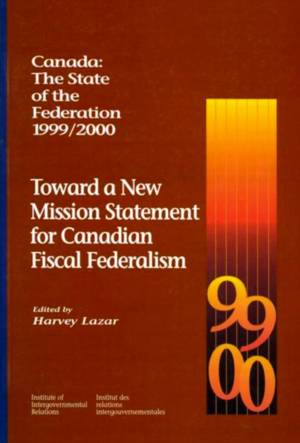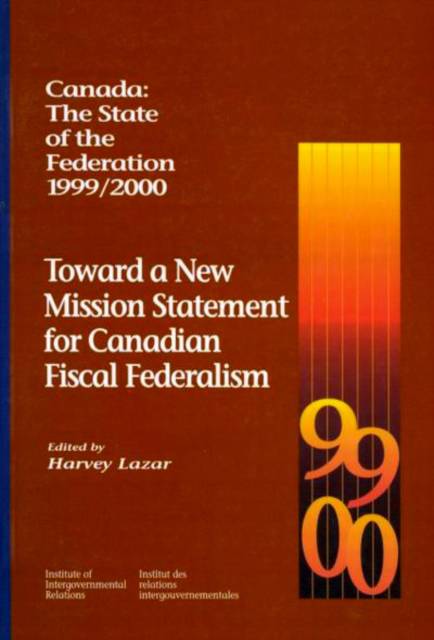
Je cadeautjes zeker op tijd in huis hebben voor de feestdagen? Kom langs in onze winkels en vind het perfecte geschenk!
- Afhalen na 1 uur in een winkel met voorraad
- Gratis thuislevering in België vanaf € 30
- Ruim aanbod met 7 miljoen producten
Je cadeautjes zeker op tijd in huis hebben voor de feestdagen? Kom langs in onze winkels en vind het perfecte geschenk!
- Afhalen na 1 uur in een winkel met voorraad
- Gratis thuislevering in België vanaf € 30
- Ruim aanbod met 7 miljoen producten
Zoeken
Canada: The State of the Federation, 1999-2000
Toward a New Mission Statement for Canadian Fiscal Federationvolume 55
Harvey Lazar
€ 49,95
+ 99 punten
Omschrijving
The authors begin with an examination of recent developments in the theoretical literature surrounding fiscal federalism. They then examine some of the major issues facing the federation - Is there a vertical imbalance between federal and provincial governments? Does Ottawa collect more revenues than are needed relative to its spending responsibilities while the provinces are under-funded? How do federal-provincial struggles over money and jurisdictional power affect local government or the para-public sector, emerging aboriginal governments, and citizens? Federal government actions in 1999 suggest that Ottawa has not lost all of its interest in social outcomes. It is, however, seeking to influence the well-being of citizens by transferring money to them directly rather than through transfers to provinces. The authors suggest that if this trend continues the approach to the millennium will be seen as a watershed in public policy, given that current trends in Canadian fiscal federalism are as much about re-balancing the federation as they are about decentralization. Contributors include Frances Abele (Carleton), Richard Bird (Toronto), Robin Boadway (Queen's), Estée Garfin (Queen's), Paul Hobson (Queen's), Harry Kitchen (Trent), Harvey Lazar, Jack Mintz (C.D. Howe), Ken Norrie (Alberta), Lars Osberg (Dalhousie), Michael Prince (Victoria), France St-Hilaire (Institute for Research on Public Policy), François Vaillancourt (Montreal), Ronald Watts (Queen's), and Sam Wilson (Alberta).
Specificaties
Betrokkenen
- Auteur(s):
- Uitgeverij:
Inhoud
- Aantal bladzijden:
- 350
- Taal:
- Engels
- Reeks:
- Reeksnummer:
- nr. 55
Eigenschappen
- Productcode (EAN):
- 9780889118430
- Verschijningsdatum:
- 1/08/2000
- Uitvoering:
- Paperback
- Formaat:
- Trade paperback (VS)
- Afmetingen:
- 152 mm x 228 mm
- Gewicht:
- 743 g

Alleen bij Standaard Boekhandel
+ 99 punten op je klantenkaart van Standaard Boekhandel
Beoordelingen
We publiceren alleen reviews die voldoen aan de voorwaarden voor reviews. Bekijk onze voorwaarden voor reviews.









